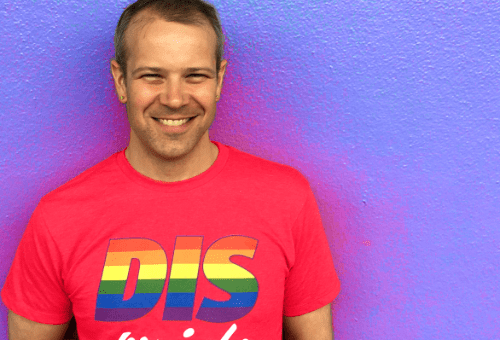In celebration of LGBTSTEMDay, we talk with Bryce Hughes of Montana State University about his research into the factors that influence the retention of LGBQ students in STEM programs. His open-access article, “Coming out in STEM: Factors affecting retention of sexual minority STEM students” was published on March 14, 2018 in Science Advances.
Websites and other resources
- “STEM is losing male LGBQ undergrads” (commentary in Science on Bryce’s article)
- “Thinking about sexual orientation: College experiences that predict identity salience” (new article with Sylvia Hurtado in the Journal of College Student Development)
- “#500QueerScientists Celebrates Diversity in Science – Something We Desperately Need” commentary in ScienceAlert)
- “The Forgotten Scientists: LGBQT in STEM” (Union of Concerned Scientists blog)
- “Breaking Through the Ice: LGBTQ+ Visibility in Stem” (Union of Concerned Scientists blog)
- “Navigating the heteronormativity of engineering: the experiences of lesbian, gay, and bisexual students” (paper by Erin Cech & Tom Waidzunas in Engineering Studies)
- LGBTQ issues in education: Advancing a research agenda (book, with chapter by Kristen Renn)
- oSTEM (Out in Science, Technology, Engineering, and Mathematics)
- NOGLSTP (National Organization of Gay & Lesbian Scientists and Technical Professionals)
- Safe Zone Project
Press coverage
Inverse | GenomeWeb | The Scientist | Chemical & Engineering News | Times Higher Education | AAAS EurekAlert | phys.org | The Conversation
Bonus Clips
Patrons of Parsing Science gain exclusive access to bonus clips from all our episodes and can also download mp3s of every individual episode.
Support us for as little as $1 per month at Patreon. Cancel anytime.
Patrons can access bonus content here.

We’re not a registered tax-exempt organization, so unfortunately gifts aren’t tax deductible.
Hosts / Producers
Doug Leigh & Ryan Watkins
How to Cite
Leigh, D., Watkins, R., & Hughes, B. (2018, July 5). Parsing Science – Retaining LGBQ Undergraduates in STEM. figshare. https://doi.org/10.6084/m9.figshare.6741911
Music
What’s The Angle? by Shane Ivers



Just days before we spoke with him, Bryce had already published a new research paper, this time with Sylvia Hurtado, on how college creates opportunities for students to think about their sexual orientation. Ryan and I asked Bryce to talk about what their study set out to learn and, broadly, what they found.@rwatkins says:
It’s estimated that about 11,000 to 35,000 LGBQ students graduate with STEM degrees in the United States annually. If an additional 7.3% were retained in STEM programs, it could increase that number by about 800 to 2600 LGBQ STEM graduates each year. So Doug and I were interested in learning what kinds of resources exist to support these students.@rwatkins says:
Overall, women are about 20%-30% less likely to remain within science, technology, engineering and math programs than men. Interestingly, however, Bryce found that this gender disparity didn’t necessarily hold in the same way for LGBQ students as it did among hetero students.@rwatkins says:
Just a quick note: Specifically, Bryce’s study found that 49.4% of sexual minority STEM students reported participating in undergraduate research programs, versus 41.1% of heterosexual STEM students.@rwatkins says:
Doug and I had a roommate in college who was dismissed from her advisor’s lab and eventually decided to leave STEM behind and instead pursue a counselling degree. We weren’t surprised, then, to learn that Bryce found that students’ participation in undergraduate research programs was the most influential predictor of their retention in STEM degrees. But we were surprised to learn about an unusual paradox that he found among sexual minority students who take part in these types of programs.@rwatkins says:
Bryce used data from two national longitudinal surveys in his study. Ryan and I were curious to learn more about how the surveys were developed and how they’re used in examining students’ identification with STEM.@rwatkins says:
Initially, Bryce calculated that sexual minority undergraduate students were 8% more likely to switch from a STEM major to a non-STEM program over four years. As it turns out, though, he discovered that his calculations were a bit off, as we’ll hear after a short break.@rwatkins says:
With this groundwork set, we asked Bryce to lay out what his study’s main aims and findings were.@rwatkins says:
From LGBT STEM Day and the “Oscars So White” Movement to immigration and free speech on campuses, diversity is a prominent topic of discussion not just on social media, but in the national media as well. Doug and I were interested in learning what Bryce believes is important about enhancing diversity within STEM … or any field for that matter.@rwatkins says:
Ryan and I began our conversation by asking Bryce what led to his interest in studying the factors that may affect the retention of sexual minority students in STEM programs, and how this particular project came about.